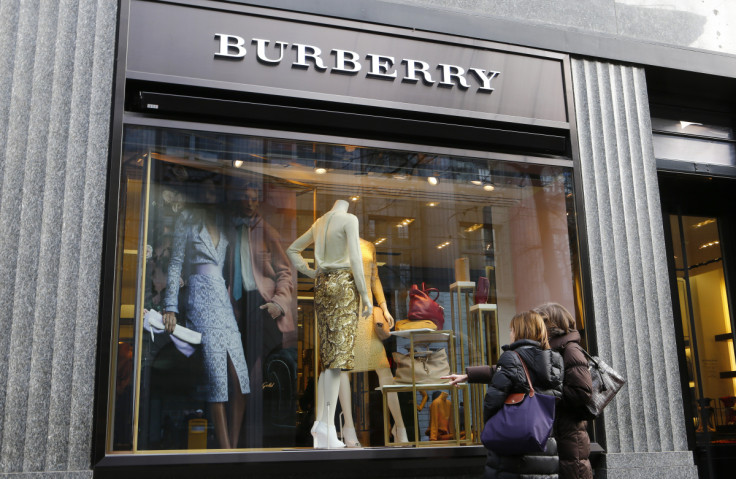Burberry Wields The Axe: 1,700 Jobs Slashed As Luxury Giant Battles £66M Meltdown

Following its series of underperformance, British luxury stalwart Burberry is undergoing its 'transformation' after registering £66 million in losses for the last financial year.
The brand, now under the leadership of chief executive Joshua Schulman, is looking into job cuts from its UK operations and reshuffling leadership for change in the operational strategy for Burberry as it tries to reclaim its place among European's premier luxury houses.
Global Job Cuts
A latest report suggest that Burberry is cutting around 1,700 jobs as part of plans to reduce costs by 2027. The job cuts would reduce Burberry's global workforce by a fifth or 20%.
According to the BBC, chief executive Schulman said the cuts will focus more on its UK operations, specifically redundancies at its Castleford factory in West Yorkshire.
He also highlighted that while many of the job cuts would be focused on its UK office, there will also be redundancies from its head office teams globally.
As part of the reorganisation, staff schedules would be restructured, and overnight shifts at the Castleford factory—where trench coats ranging from £1,000 to £10,000 are produced—would be eliminated.
'For a long time, we have had overcapacity at that facility, which is not sustainable. But I want to be clear that we are making this change to safeguard our UK manufacturing, and in fact, we will be making a significant investment to renovate this factory in the second half,' he added.
A Year-Long Leadership Shakeup
Burberry has undergone a significant leadership transformation over the past year to revive its performance and refocus its brand identity. In July 2024, Schulman was appointed as the new chief executive, replacing Jonathan Akeroyd. Schulman, known for successful stints at Coach and Michael Kors, was expected to return Burberry to its heritage roots while enhancing product appeal and global relevance.
Supporting this direction, Schulman has made key executive hires, including Jonathan Kiman as Chief Marketing Officer and Laura Dubin-Wander as President of the Americas. Charlotte Baldwin also joined as Chief Information Officer, bringing digital and IT expertise from Costa Coffee. At the board level, Prada's former CFO, Alessandra Cozzani, was appointed as a non-executive director, while Debra Lee retired after nearly five years of service. These strategic moves reflect a concerted push to reinvigorate the brand.
A Challenging FY2024
Burberry faced a challenging fiscal year ending on March 30, 2024, marked by a significant decline in financial performance. The company reported a 4% drop in revenue to £2.97 billion and a 25% decrease in adjusted operating profit at constant exchange rates, totalling £418 million. These figures reflect the impact of a global luxury market downturn and decreased demand in key regions, including the US and China.
The company's pre-tax profit fell to £383 million, down from £634 million the previous year. Amidst these challenges, Burberry's leadership emphasised progress in refocusing the brand image, evolving product offerings, and strengthening distribution channels.
Despite the setbacks, Burberry's shares rose 8% following the announcement of their restructuring, indicating investor confidence in the company's turnaround strategy. The company remains committed to its British manufacturing roots and plans to invest in UK operations while adjusting pricing strategies to broaden its customer base.
Comparing Burberry to Competitors
In 2024, LVMH reported a modest 1% increase in revenue to £71.33 billion (€84.7 billion), though its profit from recurring operations fell 14% to £16.51 billion (€19.6 billion), reflecting challenges in key markets like China.
Meanwhile, Kering faced a more pronounced decline, with revenue decreasing 12% to £14.48 billion (€17.2 billion) and recurring operating income dropping 46% to £2.19 billion (€2.6 billion), amid reduced store traffic and wholesale demand.
In contrast, Hermès demonstrated robust growth, with revenue rising 15% to £12.80 billion (€15.2 billion) and recurring operating income reaching £5.22 billion (€6.2 billion), maintaining a substantial operating margin of 40.5%.
For now, Burberry finds itself at a crossroads typical of legacy brands struggling with modern realities. The next 18 months will prove crucial in determining whether Schulman's medicine proves strong enough to restore this British institution to health, or whether further, more drastic measures lie ahead.
© Copyright IBTimes 2025. All rights reserved.





















